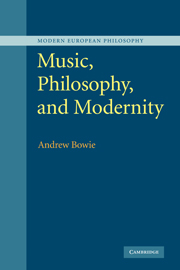Book contents
- Frontmatter
- Contents
- Preface
- Introduction
- 1 Form, feeling, metaphysics, and music
- 2 Music, language, and the origins of modernity
- 3 Rhythm and Romanticism
- 4 Hegel, philosophy and music
- 5 Music and the subjects of Romanticism
- 6 Music, freedom, and the critique of metaphysics
- 7 Pro and contra Wagner
- 8 Music, language, and being: Wittgenstein and Heidegger
- 9 Adorno: musical philosophy or philosophical music?
- Conclusion
- References
- Index
3 - Rhythm and Romanticism
Published online by Cambridge University Press: 15 October 2009
- Frontmatter
- Contents
- Preface
- Introduction
- 1 Form, feeling, metaphysics, and music
- 2 Music, language, and the origins of modernity
- 3 Rhythm and Romanticism
- 4 Hegel, philosophy and music
- 5 Music and the subjects of Romanticism
- 6 Music, freedom, and the critique of metaphysics
- 7 Pro and contra Wagner
- 8 Music, language, and being: Wittgenstein and Heidegger
- 9 Adorno: musical philosophy or philosophical music?
- Conclusion
- References
- Index
Summary
What Kant said about music, and what he could have said
In Kant's transcendental philosophy the realm of objectivity is constituted by necessary forms of thought which organise data received from the world into judgements. In some still disputed sense this means that the thinking subject is the source of the world's intelligibility. J. G. Hamann's objection to Kant was that all forms of thought depend on natural languages acquired from the external world. His objection shifts the issue of the world's intelligibility towards the kind of questions we considered in the last chapter, not least towards the question of the origin of language. Language, rather than the mind, is seen as the constitutive factor in ‘world-making’, but it is not clear how it is that language itself comes to exist in the first place, unless, as Hamann does,one argues for a divine origin. The problem of the origin of language is, as we have seen, one of the sources of music being regarded as the transition between the non-semantic and the semantic. How, then, does music relate both to Kant's idea of necessary forms of thought and to the linguistic critique of Kant? Responses to this question offer ways of understanding the particular role of music in German Romantic philosophy, as well as having resonances for contemporary philosophy.
The major factor here is the ‘in-between’ nature of both language and music that was touched on by Herder in his remarks on hearing as the mediator between feeling and vision. Because of its connection to feeling, music relates to the inner nature of the subject; it also, though, exists as a socially produced object with perceptible, physical properties.
- Type
- Chapter
- Information
- Music, Philosophy, and Modernity , pp. 79 - 104Publisher: Cambridge University PressPrint publication year: 2007

